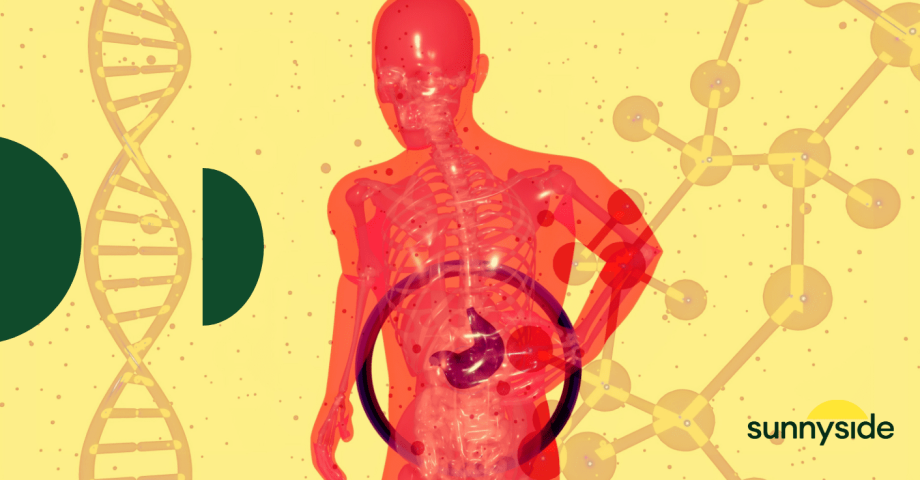Last Updated on October 3, 2023
Mindful drinking isn’t just about getting more cash in the bank or having fewer hangover headaches. It creates a domino effect that influences every area of your life. Your liver works the same way, where the smallest habit changes add up and create better overall health, both physically and mentally. Here, we’ll list some surprising ways Mindful Drinking helps you and your liver work best.
That being said, it’s important to note that if your liver is not currently in a healthy state, it’s best to avoid drinking entirely. The following practices should only be considered if your liver health is in a good state.
What exactly does the liver do?
Your liver is one of the most powerful organs you have. It’s actually listed to have over 500 functions! Not only does it break down alcohol, it also helps digest fat, store nutrients, regulate amino acids, remove bacteria, carry away waste, and support your immune system (just to name a few). Luckily, there is so much you can do to support your liver, with mindful drinking being a key step towards long term health.
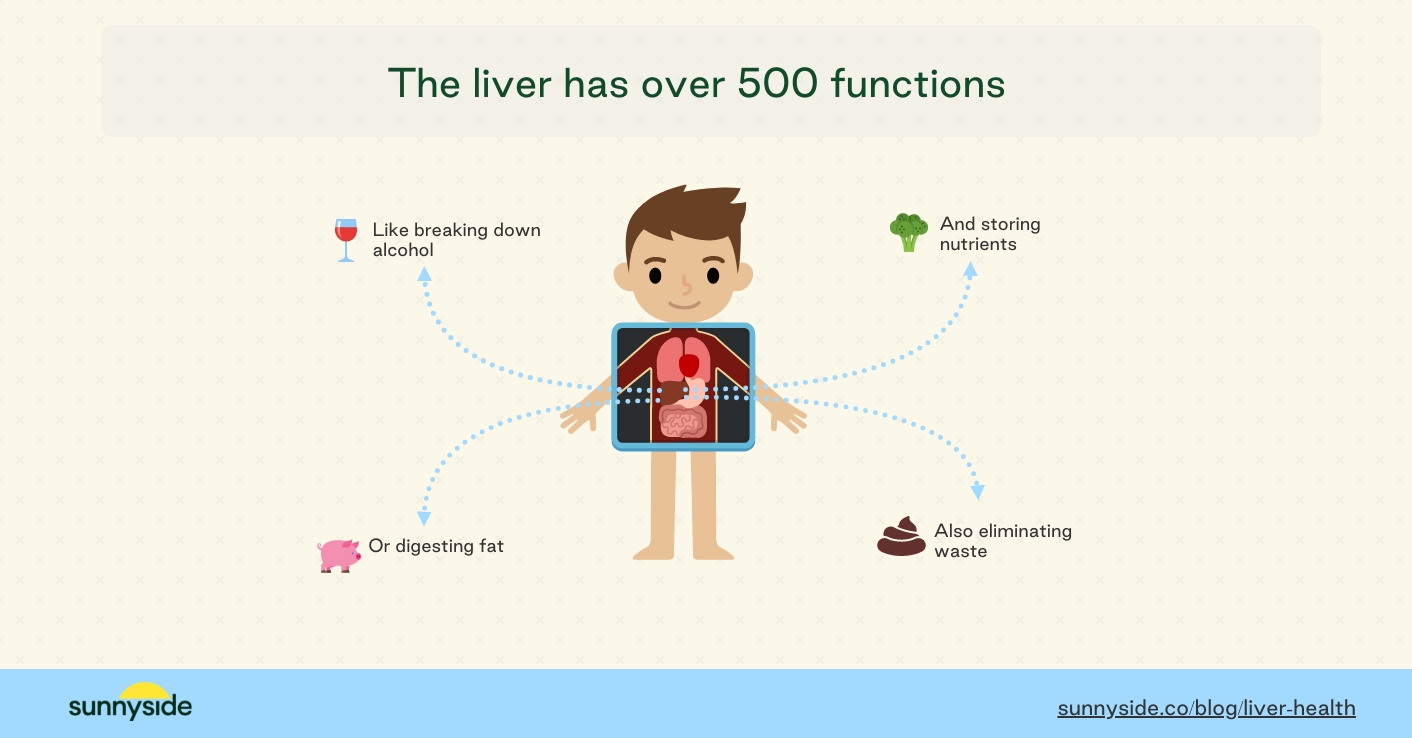
How does alcohol affect your liver?
It all depends on how often and how much you drink. In general, the liver works well to metabolize about one drink per hour. That makes moderate drinking, one to two glasses a day, relatively safe and easy on the liver, providing you’re in good health.
Binge drinking
When it comes to binge drinking, having four or more drinks within two hours, the liver gets overwhelmed and struggles to metabolize alcohol. One night of heavy drinking can lead to fat build up, just as in fatty liver disease. Although not very common, a few days of heavy drinking can even end up in acute alcoholic hepatitis. It’s an incredibly painful condition that makes the liver swell up and become inflamed. While it’s more likely to happen after many years of heavy drinking, binge drinking takes a bigger toll on the liver than most people realize.
Long term effects
Long term, too much alcohol can lead to fatty liver disease, which can be followed by alcoholic hepatitis and cirrhosis. It starts with fat building up in the liver, which creates inflammation and eventually, alcoholic hepatitis is more likely to develop. After many years, cirrhosis can progress, where the liver becomes permanently scarred and unable to function properly.
Symptoms
The thing about alcohol-related liver disease is, there are rarely any obvious symptoms to make you aware of any issues at the onset. It’s usually after the liver works too hard for several years that your body begins to let you know something’s not right. On top of that, some of the symptoms are so closely related to stress that you might overlook the liver as the cause.
Here are some common symptoms to look out for:
- Chronic fatigue
- Itchy skin
- Bruising easily
- Loss of appetite
- Nausea or vomiting
- Abdominal swelling and pain
- Ankle and leg swelling
- Pale stool
If you notice any of these symptoms, call your doctor immediately. Even if it’s just one symptom, it’s still a sign that a check up and blood tests are needed. Too often people put off going to the doctor because of a busy schedule, cost, or fear of what might be found. Just remember, all it takes is one email or phone call to take care of your future self. No matter what, the earlier you take action, the better. It doesn’t matter how long you’ve put it off before, now is always the best time. At a minimum, you will have peace of mind knowing you’re taking the most important step towards your health.
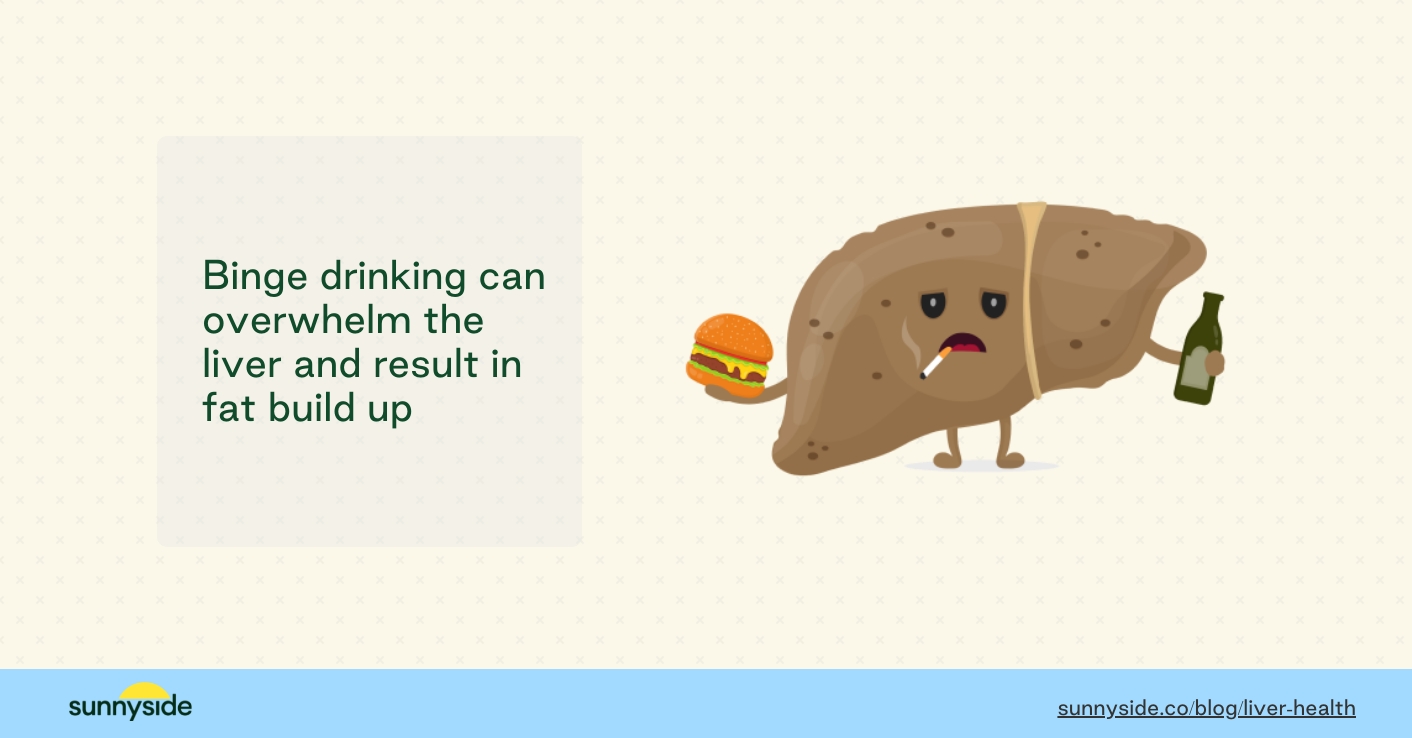
How to heal your liver
Whether through diet, habits, or genes, the liver can develop too much fat over the years. Luckily, fat build up in the liver can be completely reversible. Depending on how much you drink, after a few days of abstaining from alcohol the liver will already begin to regenerate.
Even more impressively, after just two weeks signs of fatty liver disease can be completely eliminated. The liver is an amazing and complex organ, and with a bit of nourishment, rest, and relaxation, it has the potential to heal itself. Of course, it’s important to note that any issues with the liver means completely abstaining from alcohol for the future is recommended.
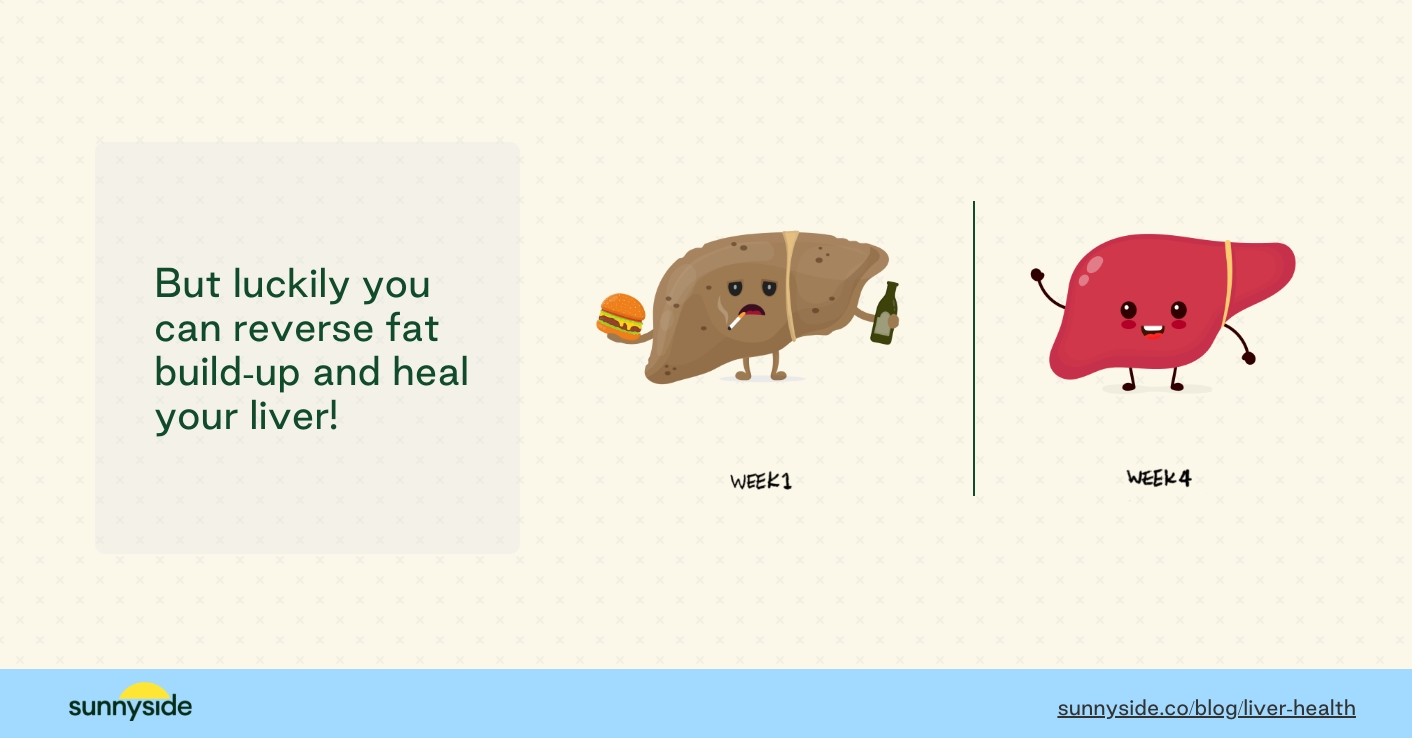
6 ways mindful drinking helps you feel your best:
Mindful drinking does so much more to help the liver than just reduce its alcoholic load. The ripple effects of drinking less help to heal the liver in ways that at first seem completely unrelated. It’s an organ affected by so much more than alcohol, so even slight changes towards healthier habits make you feel better everyday.
1) Eases anxiety and depression
Alcohol can make you feel depressed after just one night of heavy drinking.
While alcohol is viewed around the world as something to ‘take the edge off’, it tends to do the exact opposite. Thanks to the initial dopamine hit you feel better in the moment, but the after effects of drinking too much not only reverse that initial good feeling but end up even worse. The next day is a mix of dehydration, low blood sugar, and exhaustion. It’s definitely not a pleasant way to spend the day, and feelings of depression can start to creep up. Anxiety also often worsens the day after because of the changes in feel-good neurotransmitters like serotonin and dopamine.
Chemical changes happen with long term alcohol use.
Long term, the brain can become dependent on the dopamine release of alcohol and begin producing less on its own to compensate. You could end up with a daily dopamine deficit, leading to constant low moods and energy levels.
Depression and anxiety are associated with fatty liver disease.
Crazy enough, fatty liver disease isn’t just related to alcohol or diet. It can actually develop in people with chronic anxiety and depression, too. There is a strong correlation between people with anxiety and depression and non-alcoholic fatty liver disease. Which means, mindful drinking can help to prevent liver issues not only because of less alcohol for the liver to process, but also through a better overall mood.
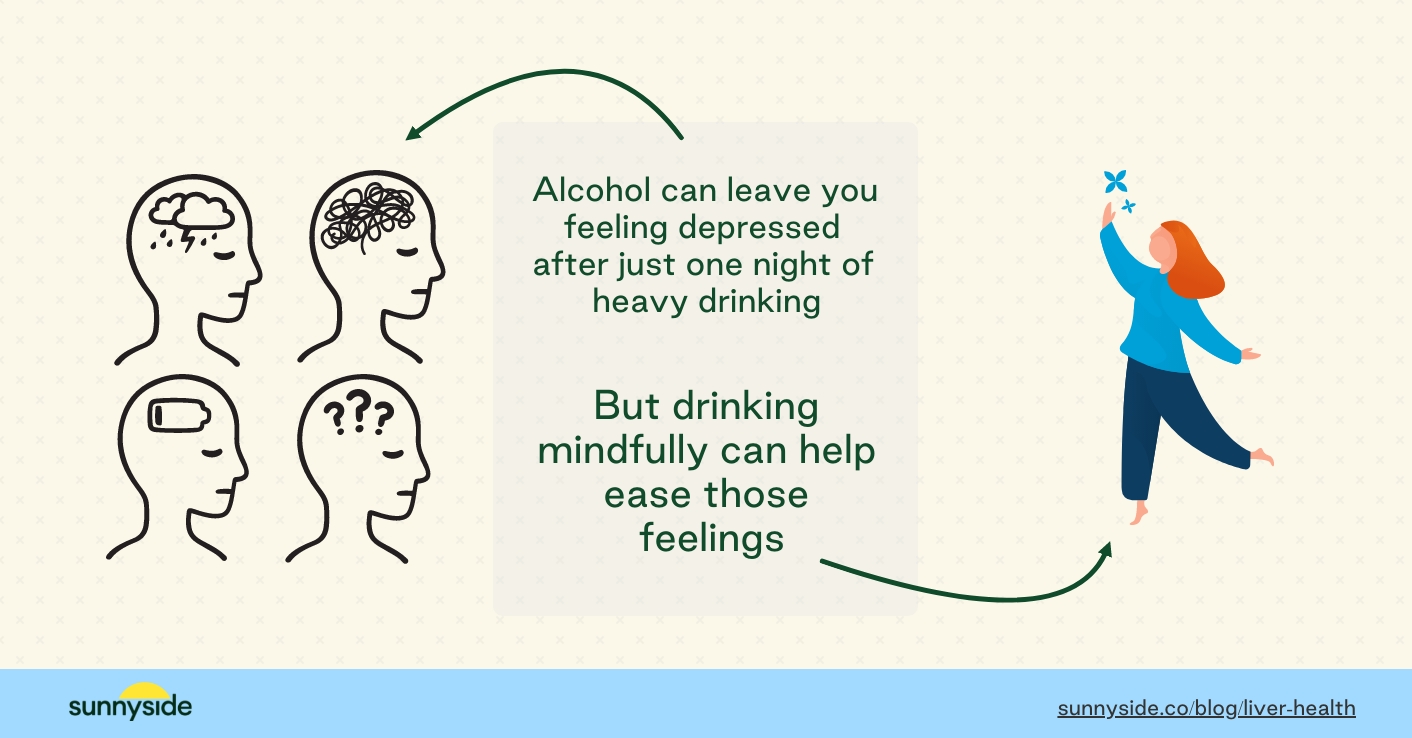
2) Better sleep
Alcohol keeps your body awake during the night.
Alcohol affects your quality of sleep in many ways. While it may help you fall asleep quicker, drinking before bed often ends up in a disrupted night’s sleep and a very groggy morning. The first few hours after a heavy night of drinking may seem like a deep sleep, but the second half of the night is disrupted, leaving your body unable to rest and heal properly. Long term, drinking too often leads to chronic sleep issues, including insomnia, making it difficult to rest and regenerate the cells of your body.
The liver has a clock of its own.
Sleep is essential for the liver to regulate hormones. Its system works like a clock, and disruptions to its pattern puts it at risk. Not getting enough sleep is directly associated with fatty liver disease.
Mindful drinking can help you become aware of nighttime habits.
Knowing how alcohol disrupts your sleep and being observant of how you feel the next day can help when it comes to drinking mindfully. You’ll be able to start observing, without judgment, how you’re affected and whether or not it works for you. These observations may help you to take actions towards conscious choices that help you feel your best. Slowing down, understanding your body, and paying attention to what it’s telling you gives you the tools you need to mindfully care for yourself.

3) Less work for the liver
The less of an alcoholic load put on the liver, the better. One or two drinks can be fine, but any more than that, and the liver begins to have difficulty taking care of all its 500 plus functions. Metabolizing the alcohol becomes a priority, leaving other work piling up. It’s kind of like a traffic jam, where all the cars are trying to move forward but one giant truck is stopped, blocking everyone else and taking up the whole freeway. The more free space you give, the better it runs.
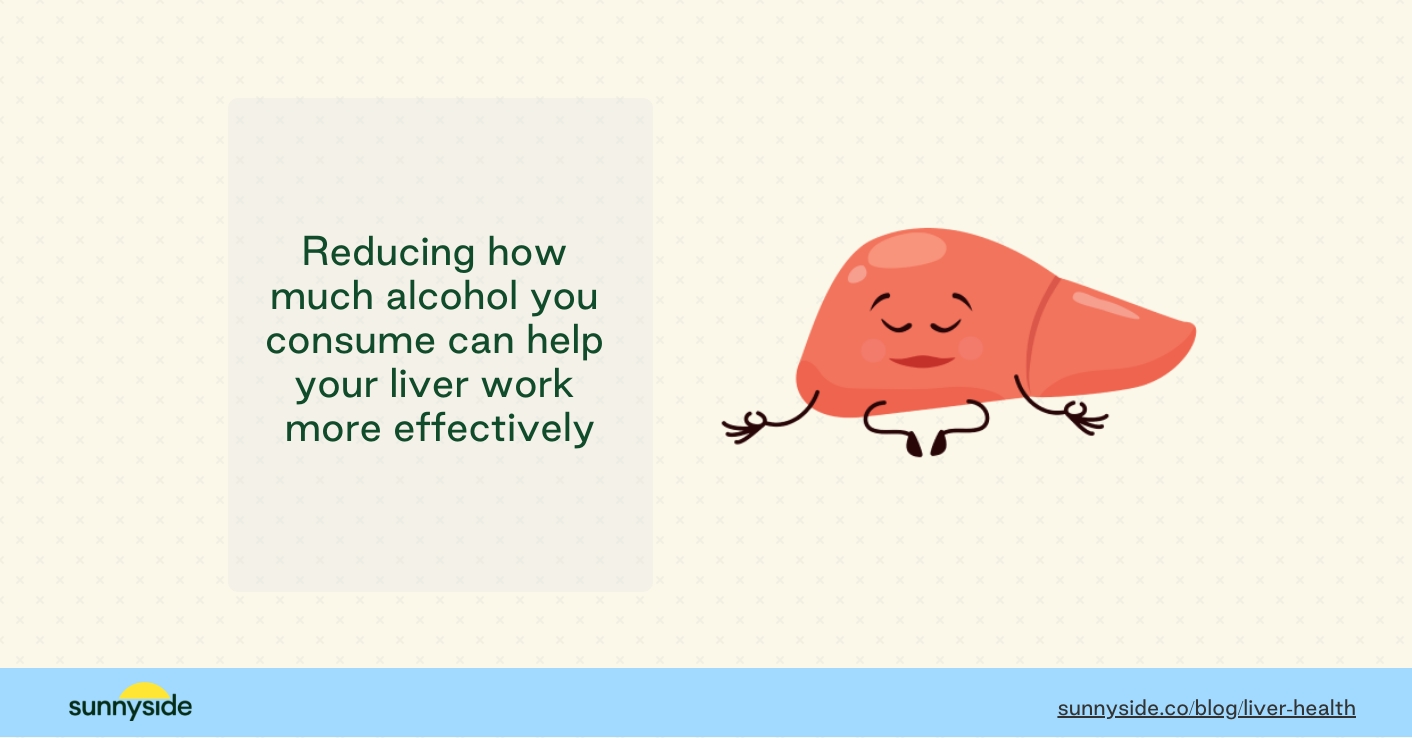
4) Weight loss
Fewer drinks means fewer calories.
Less drinking helps the body to shed excess weight in a few different ways. First, fewer calories are consumed, and even if it’s just one drink, it makes a difference. About 100 calories less per day equals at least 5 pounds less over the course of one year. Opting for low-calorie drinks is always a way to consider being more mindful with your drinking.
The type of calories you consume matters.
It’s also about the specific type of calories. Alcohol often comes with a lot of sugar, both from the alcohol itself as well as the added juices and sodas. These kinds of sugars are quickly absorbed into the bloodstream, making your organs, like the pancreas, release a ton of insulin to help absorb the sugar into your cells and to store it as fat.
Alcohol always gets first run at energy to be used, so any other calories end up storing themselves for later use. All these added sugars cause a lot of extra work on your liver and body in total. Sugars lead to hormonal imbalances, diabetes, and even anxiety and depression. They interact with dopamine and can cause chemical dependence, much like alcohol.
Inflammation decreases as time to heal increases.
Reducing added calories and sugar helps the liver to increase its natural enzymes and lower inflammation. This break from added stress gives your liver the time and energy to heal and regenerate. Cells break down constantly, it’s a natural part of aging, and keeping the liver strong helps to keep your entire body healthy. Here are some low-calorie alcoholic and non-alcoholic drinks you can try to help you stay mindful.

5) Healthier food choices
Mindful drinking often leads to mindful eating.
When you’re paying attention to what you’re consuming, it isn’t just drinks that are noticed. Drinking mindfully also helps you have the energy and mindset to eat mindfully. You’re able to be fully present and take stock of what your body is telling you. It might not be hungry at all, or just wanting some water. Either way, without paying attention it’s easy to miss the signs.
Healthy food is more appealing when you’re paying attention to your body’s needs.
Since mindful drinking can lead to less drinking, it’s easier to want to make better food choices. We all know the stereotype of ordering pizza after a night out with too many drinks, but if you’re drinking less, you might be creating that domino effect of getting home earlier and going to bed rather than staying awake long enough to get hungry again. Either way, being more mindful means you’re more attentive to your body’s needs. If you’re also curious about how alcohol can impact your health, YorkTest Laboratories offers a premium food sensitivity test that tests for over 200 food and drink ingredients, including grapes found in wines such as Chardonnay, Merlot, Red Zinfandel Mix and Pinot Grigio. On top of that, you’re more likely to think of your future. You have the capacity to ask yourself how you’d feel after eating, leading you to make better choices for your body.
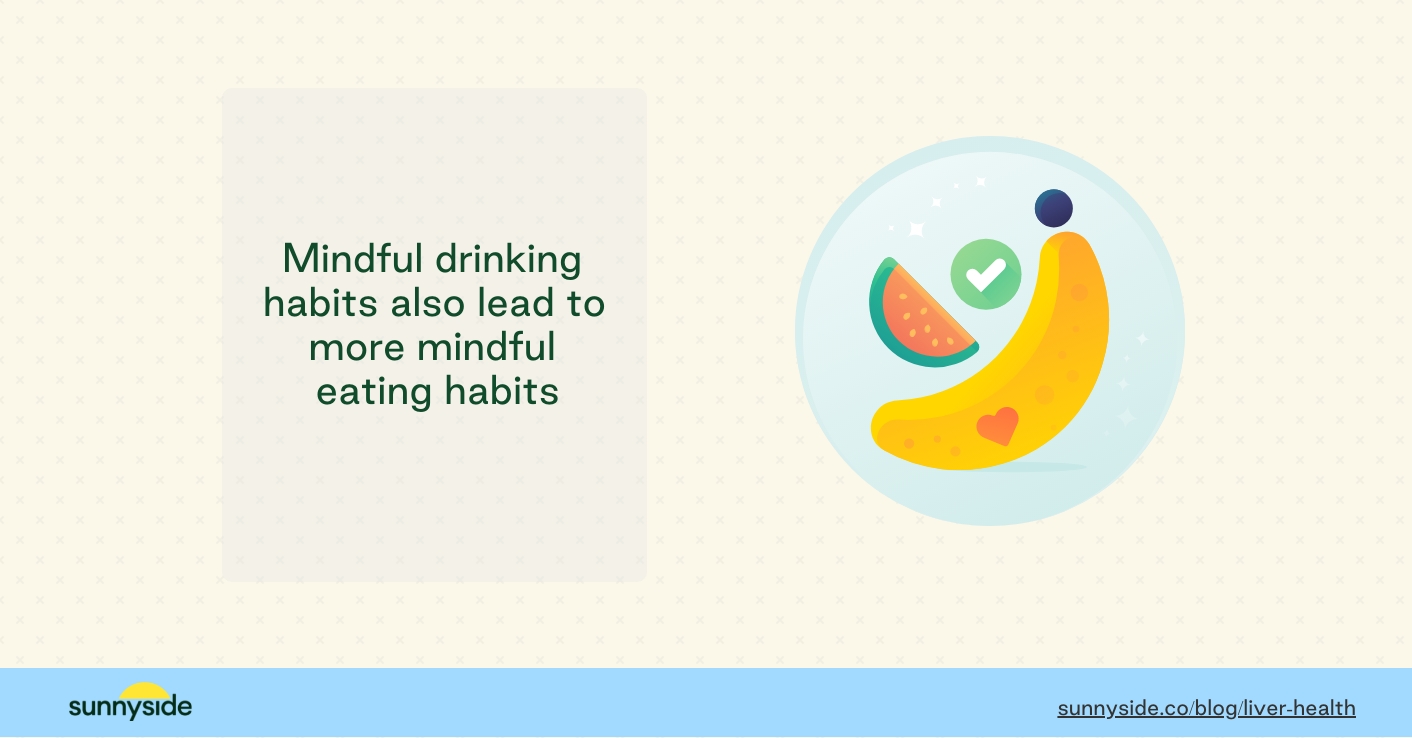
6) More energy
When you’re paying attention to your body, you’re more likely to know when it’s tired and needing rest. Mindful drinking means you’re observing how you’re feeling, making you more likely to choose feeling energized and rested. With more time resting, your liver has time to heal, too.
With added energy from drinking less, you’re also more likely to have the energy to move your body more. Whether it be through more daily walks, yoga, or trips to the gym, your liver will thank you. Movement is essential to keep hormones working well. It also lets the liver reduce fatty acid, healing and preventing various liver diseases.
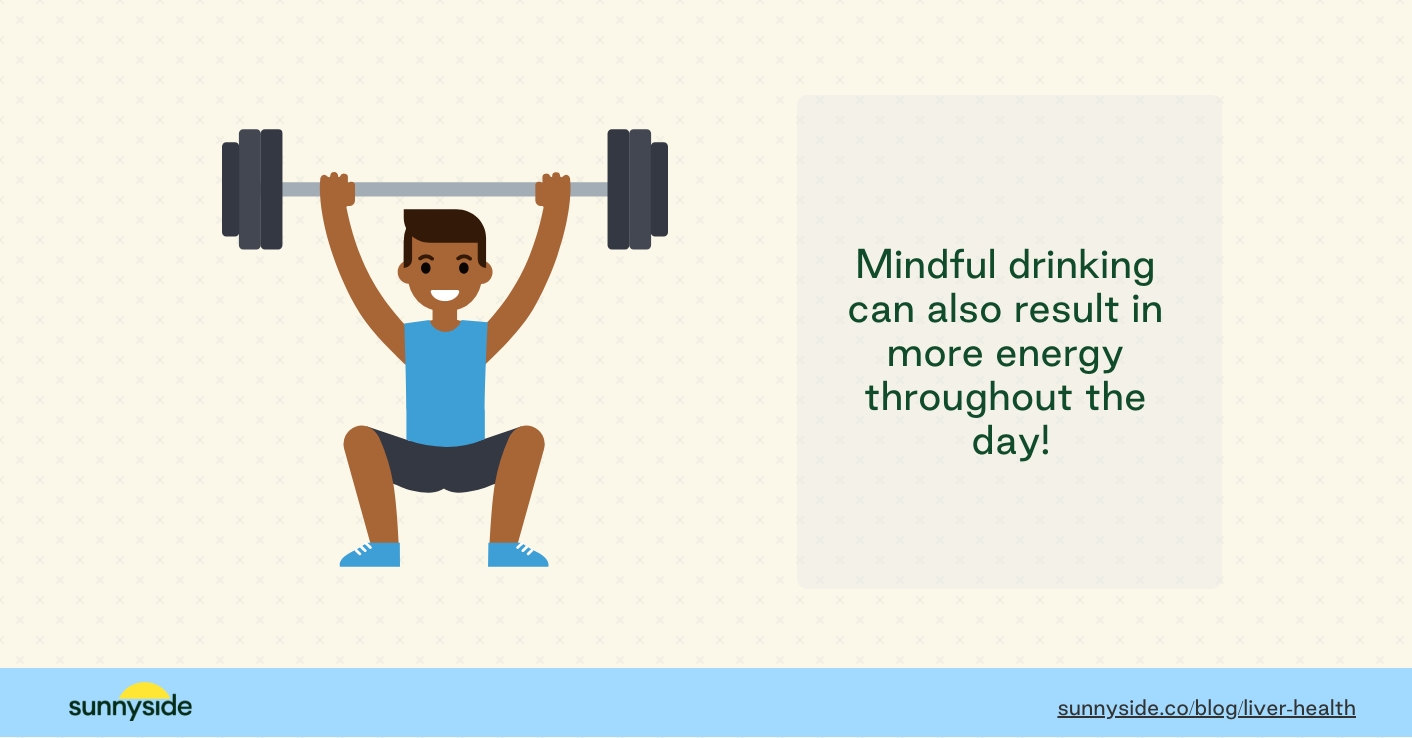
What else can you do to help your liver?
Hydrate
Hangovers are always worse when you’re dehydrated. Alcohol makes your body produce more urine, automatically making you more likely to be dehydrated, but that’s just one reason why a hangover is terrible. Drinking also causes inflammation, irritates your stomach lining, makes your blood sugar drop (making you cranky) and your blood vessels expand (giving you headaches). Hydrating is one of the best ways to help your liver manage all these symptoms better.
Staying hydrated throughout the day, every day, makes a difference.
While in the movies we see actors chugging power drinks and water the morning after a night of heavy drinking, that’s not the only way to make sure you’re giving your body what it needs. Hydrating yourself well every day leads to long term health for the liver.
Consider the morning your time to chug.
Drinking water throughout the day is essential, but it’s also shown that hydrating first thing in the morning can really jump start your body into an awake state. Either way, if you miss your morning glass of water, it’s ok. Drinking water at any time of the day can reverse any signs of dehydration.
A big reason why drinking water in the morning is promoted is simply because if you make it an intentional habit first thing, it’s more likely you’ll get enough by the end of the day. You could just as easily tie it to any other habit that reminds you to hydrate. For example, as soon as you get in the car for work, you drink from the water bottle in the cup holder. As soon as you get to the office, you grab a glass for your desk. As soon as you get home from work, you put on the kettle for some tea. You get the idea, habit stacking makes it more likely to complete anything new you’re like to add to your day.
If you want to see how your liver health stacks up, be sure to check out Cheers Health’s Liver Habits Score.Build healthier drinking habits
Add Foods that help heal your liver
Eating natural whole foods nourishes the body and allows it to not just heal, but thrive. The foods humans evolved with help the body to grow, while processed foods and preservatives create extra work on the digestive system and organs, especially the liver.
Here’s a list of the foods known to help your liver thrive:
1) Leafy greens
Dark leafy greens are one of the most antioxidant packed superfoods out there. They lower inflammation and help to heal and protect your body from pretty much every disease and ailment out there. They’re full of fiber and feed the good bacteria in your gut, making them especially great on your digestive system, too. What makes them especially amazing for the liver is a compound called inorganic nitrite that reduces fat build up.
2) Citrus fruit
Citrus fruits are amazing because they’re super flavorful and can be quite sweet (like an orange) but they don’t cause a blood sugar spike. The grapefruit, in particular, is known to have antioxidants that protect the liver. Just be sure to double check with any medication you’re taking, since grapefruit often isn’t allowed for many, especially blood thinners.
3) Green tea
Green tea is one of the most powerful antioxidants on this planet. People who drink regularly are known to have the lowest risks for cancers, heart disease, and even diabetes and obesity. It’s truly a cup full of potential.
If you’re not a tea drinker, check out recipes that brew it into cold iced tea. You can still get all the benefits, along with some tasty and refreshing hydration. It’s definitely a drink you can experiment with by adding mint, orange, lemon, or ginger to mask or add to the green tea flavor.
Keep in mind that as with most foods, it’s always easier for your body to absorb the nutrients when you get it in its whole form. Sometimes, supplements can be so potent that they cause anxiety, headaches, and heart palpitations. Be wary of green tea supplements and do your research on their potency. Brewing a cup is always your best bet. Plus, now that tea is becoming more and more popular, there are never ending flavor options to try (green tea with orange is pretty awesome!).
4) Cruciferous vegetables
Broccoli, cauliflower, cabbage, brussel sprouts, and even radishes have powerful components to combat fatty liver disease. They’ve got special detoxification enzymes that protect the liver and help to heal fatty build up.
If you aren’t a fan of the flavors, it’s time to experiment with recipes that mask these potent veggies. For example, a great soy sauce (or coconut aminos as a soy-free plant replacement) can make a delicious pad thai or stir fry with a powerful soy and peanut butter flavor.
5) Healthy fats; olive oil, nuts, seeds, fatty fish, avocados
Everyone always talks about how amazing the Mediterranean diet is, and they’re right. Luckily enough, it’s pretty easy to slowly add in a few of the staples that make this diet so great.
For example, you can swap out butter for olive oil, a powerful antioxidant that reduces fat build up in the liver. Don’t worry about the calories when it comes to nutrient dense foods. The higher the nutrition content, the more likely you are to feel satisfied and snack less later on. The same goes for eating nuts and seeds or adding it on top of your meals. Like olive oil, they are rich in antioxidants and associated with a reduced risk of fatty liver disease. It’s worth it to add on calories for extra nutrients! Hunger hormones and satiety signals respond to natural foods, helping to prevent you from overeating. So in general, the more nutrient dense you eat, the better off your health, no matter what.
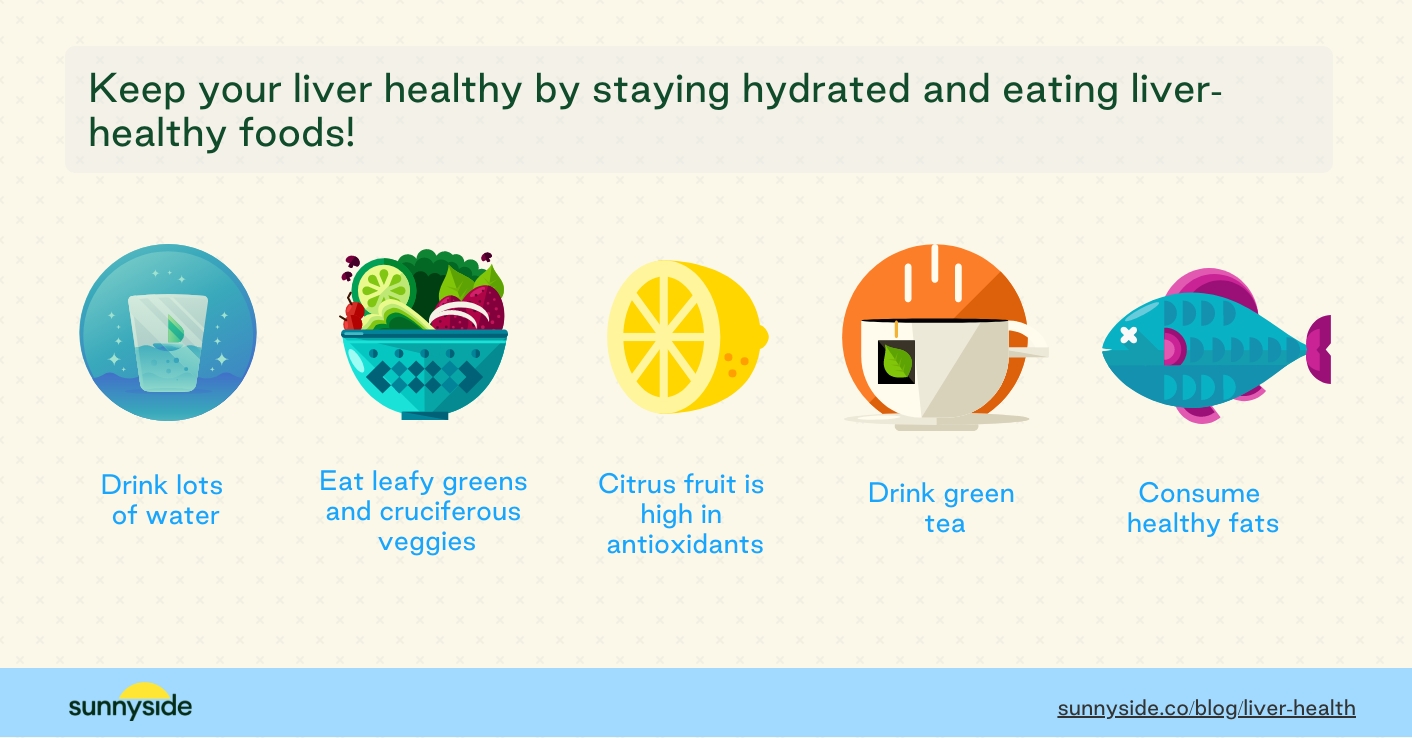
How Sunnyside can help
Drinking mindfully doesn’t always come naturally. Stress, hard times, and old unhealthy habits easily get in the way of living mindfully. That’s why Sunnyside was created, to help you find a balance that works for you. There’s no pressure, no “all or nothing” attitude, just simple and mindful tips that guide you towards your most energetic and healthy self. Sunnyside lets you discover what fits your lifestyle best. It’s flexible to whatever goals or intentions you have, without judgment. We’re here to support you as you move towards a more mindful life, whatever that looks like for you.
Disclaimer: This article is not medical advice nor is it for anyone with a liver condition or health issue. While avoiding alcohol is the best way to limit liver damage, for those who choose to drink, mindful drinking and living can be of help. This article is intended for people who choose to drink and want to take steps to maintain a healthy liver. Please keep in mind, regular check ups are essential as many signs and symptoms of liver issues can go unnoticed. Always consult a medical professional for any questions or doubts regarding your physical and mental health.
